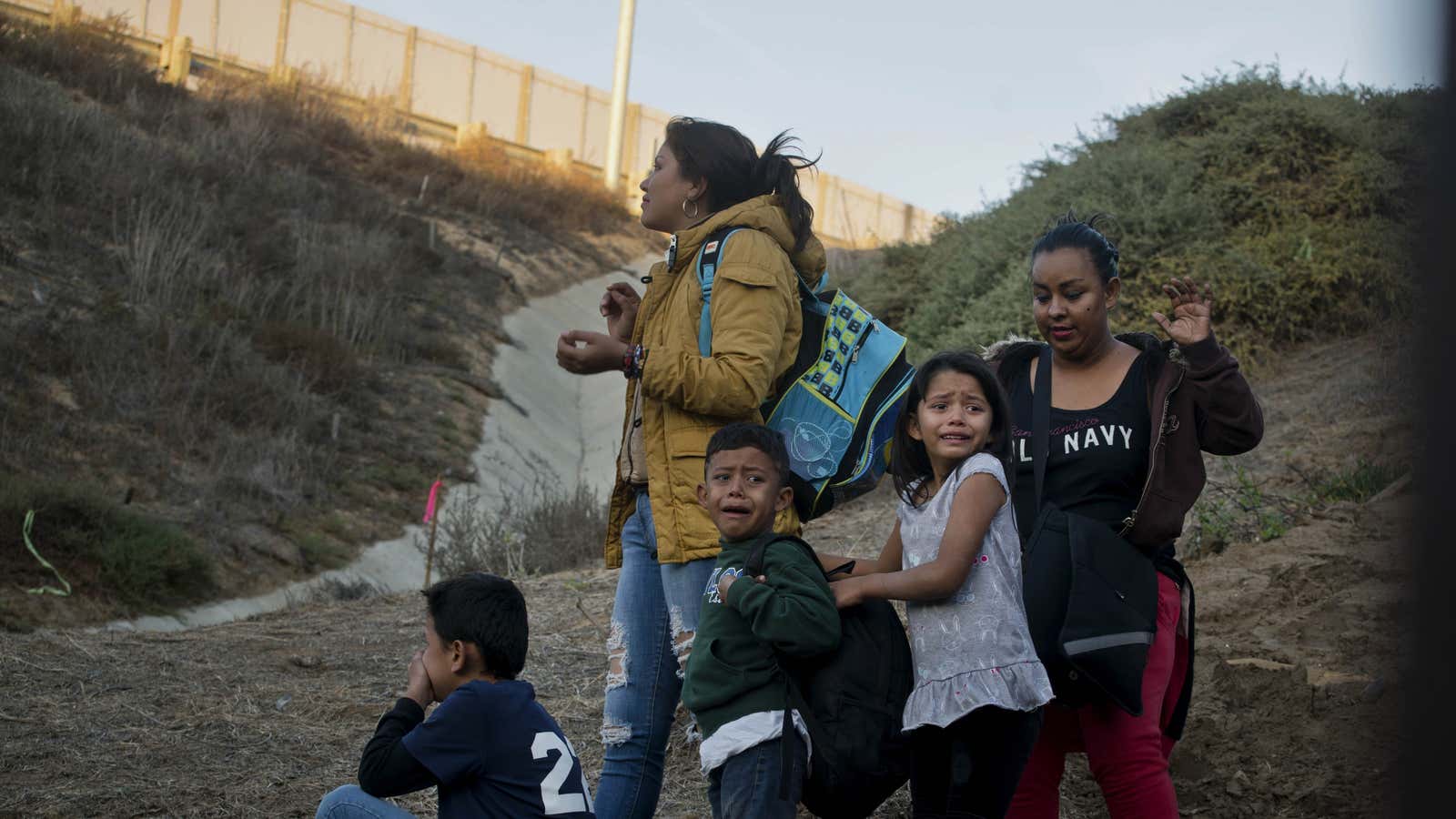The two Democratic candidates from Texas sparred over an obscure part of the US Code during the first primary debate this week.
Julián Castro, former San Antonio mayor and Housing and Urban Development secretary, wants to repeal Section 1325, which states that entering the US between ports of entry is a crime. Former congressman Beto O’Rourke, from El Paso, wants to keep it.
It’s a narrow question, but it sheds light on the convoluted way the US handles illegal immigration. At the first level, US authorities deal with it through a civil process. The consequence for someone who comes into the country without permission is straightforward: deportation. But on top of that, authorities can also choose to funnel that same immigrant for the same action through the criminal system, using Section 1325.
What would happen if that second layer disappeared and crossing the border illegally were no longer a crime? The answer is more complicated than you may think.
What’s the point of Section 1325?
Originally, the law was conceived in the late 1920s to reduce the number of Mexicans who came to the US, according to Kelly Lytle Hernandez, a history professor at University of California Los Angeles. Before the law, entering the US without papers wasn’t a crime. Though they were supposed to enter through regular ports of entry, Mexican laborers crossed the border informally with no consequences. But then white supremacists started getting antsy as some of those laborers permanently settled in the US, Hernandez wrote in The Conversation.
Among those against non-white immigration was a South Carolina senator named Coleman Livingston Blease. He suggested making crossing the border between ports of entry a misdemeanor. His proposal, which passed in 1929, became Section 1325.
These days, authorities are similarly using 1325 to deter people from coming to the US illegally, more than to punish them for it, says Kit Johnson, a professor at University of Oklahoma’s College of Law. Deportation already serves that purpose. “It’s unnecessary layering on top,” she adds.
Operation Streamline
While US authorities used Blease’s law to jail tens of thousands of Mexicans in the years after it passed, the practice died down in following decades. It was revived by George W. Bush, whose administration ramped up 1325 prosecutions in 2005 in response to the rising number of people from countries other than Mexico crossing into the US illegally.
The operation, dubbed Streamline, accomplished the opposite of what its name suggested. It generated a barrage of 1325 cases that clogged federal courts along the border and crowded prisons with immigrants. Illegal entry, a misdemeanor, is punishable with up to six months in prison.
“By and large, they were people without any kind of criminal history coming here to try to better their lives,” says University of North Texas at Dallas law professor Brian Owsley, who oversaw many 1325 cases as a magistrate judge in South Texas.
Towards the end of Barack Obama’s second term, immigration authorities became more selective about who they prosecuted. They mostly focused on people who committed serious crimes, and the number of illegal entry cases dropped.
Zero Tolerance
Last year, Trump rolled out his Zero Tolerance policy. Under it, government prosecutors were instructed to charge every single person who entered the US without documents with a 1325 violation. The criminal courts again got flooded.
The Trump administration also used the law to justify separating children from their families. The consequence for adults who break the law is being separated from their children when they go to jail, Homeland Security secretary Kirstjen Nielsen repeatedly said in defense of the policy.
So, what if 1325 were repealed?
The most immediate and noticeable effect would be thinner dockets at federal criminal courts, according to experts. Federal prosecutors and judges would have more time for non-immigration related crimes. Immigrants would no longer have to serve sentences for crossing the border illegally, freeing up federal detention space. That would result in significant savings, based on the millions in taxpayer dollars that the government has spent in Operation Streamline.
That doesn’t mean that immigrants would stop being on the hook for entering the country illegally. Those who had no grounds to stay would be deported, as they are today. Those who reentered after being deported would still be subject to felony charges, and so would smugglers, drug dealers, and breakers of other laws.
Ending 1325 wouldn’t make a difference on the asylum process either. Those who request asylum would have to follow the same procedures as they do today, including being placed in detention, if authorities deem it necessary. It wouldn’t halt Trump’s policies that limit the number of people allowed to request asylum at points of entry, or force them wait in Mexico while their case is processed.
It might not even stop family separation. Trump rolled back his Zero Tolerance policy last year in response to a public outcry, but his administration has been able to continue the practice by arguing that parents pose a danger to their children.
Over time, though, repealing 1325 could have an impact on the US’s broader immigration policy. Beyond the courts, the law helped build an image of undocumented immigrants as criminals. Removing that legal label could have an effect on public opinion. That might eventually give lawmakers some political room to fix the US’s broken immigration system, including the bottlenecks in the asylum process behind the humanitarian crisis at the US-Mexico border.
“Quite literally it would mean that people who are seeking asylum are not criminals,” said Emma Winger, staff attorney with the American Immigration Council, an advocacy group.
